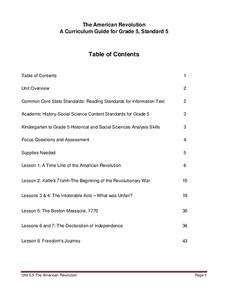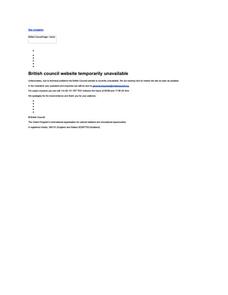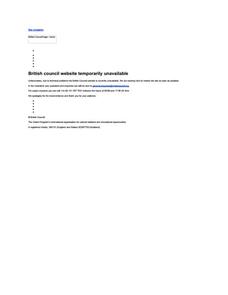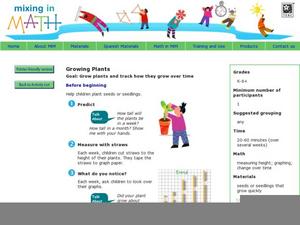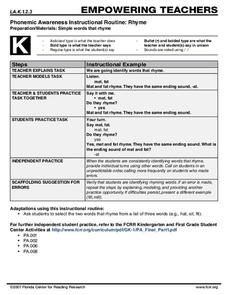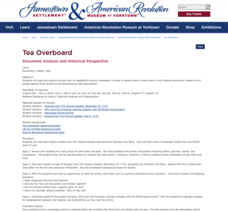PBS
Martin Luther King Jr.: Civil Rights Leader
Expand class members' appreciation of the work of Dr. Martin Luther King, Jr. A powerful resource examines King's speeches, writings, and actions that reveal his deep commitment to a nonviolent approach to Civil Rights. Learners watch a...
California State University
The American Revolution
Invite your class on a ride through the American Revolution. Young historians travel through time as they explore the events that led to the foundation of the United States of America. Over the course of eight lessons, this unit provides...
Washington Office of Superintendent of Public Instruction
Using Our Senses to Observe
Look around and explore. Little ones use their five senses with some day-to-day activities designed to guide observation and apply STEM strategies. Young scientists learn through comparing/contrasting and observing with magnifiers as...
Core Knowledge Foundation
Seasons and Weather: Supplemental Guide
From warm summer days to cold winter nights, this 10-lesson unit takes children on an exploration of seasons. Using the included reading passages and images, a series of read-aloud lessons and vocabulary activities provide young children...
Fun Music Company
Lifesavers for the Music Teacher
A symphony of ideas are contained in this eBook designed by music teachers for music teachers. The 40 activities have all proven to be lifesavers. A must-have for your curriculum library.
Mary Pope Osborne, Classroom Adventures Program
Dinosaurs Before Dark
Young readers travel back to the time of the dinosaurs in this literature unit based on the story Dinosaurs Before Dark. Intended for use with upper-elementary special education students, this resource provides reading comprehension,...
Asian Art Museum
Telling Tales with Kamishibai
Kamishibai (paper drama), is a Japanese form of storytelling that uses emakimono (paper picture scrolls), to relay a moral lesson. As part of a series of resources that examine Japanese art and artists, learners watch a video retelling...
Curated OER
Responding Syllables: Reading and Music
Shell Silverstein’s “Sick” provides an opportunity for kids to demonstrate their understanding of syllables and phonemes. The class creates a list of descriptive words used in the poem that have more than one syllable, and brainstorm how...
Scholastic
Study Jams! Properties of Addition
Zoe from the StudyJams! crew brings the properties of addition to life by clearly explaining the meaning of the associative, commutative, and identity properties as she collects photos for an album. Listen to the included karaoke song...
EngageNY
Developing Reading Fluency: Criteria for Reading Aloud
Third graders develop their reading superpowers in a lesson plan on fluency. After first listening to an audio recording or teacher read aloud, the class works together identifying criteria for fluent reading, focusing on phrasing, rate,...
Curated OER
Lesson: Differing World Views: Human and Animals
Kids challenge their understanding of the world around them and consider the impact man has on the environment and animal life. They examine a Tlingit piece, read two Tlingit stories about man and animals, then participate in a research...
Curated OER
Simple Texts for Primary Pupils
Can literacy get any more fun than this? Learners not only have fun, but gain confidence as well when presented with familiar text in another language. Select books, songs, poems, even recipes written in another language, and using the...
Curated OER
Teaching Numbers with Primary Pupils
One, two, three. Un, deux, trois. Eins, zwei, drei. Primary learners love to count and this instructional activity contains a series of games that encourage learners to count in English, French, German, and Spanish. The exercises develop...
Curated OER
Water - Our Future
How is it that water that falls as rain ends up coming out of the tap on our sinks? Learners trace water's journey and examine how along the way pollutants make their way into the water supply. They conduct experiments, use the Internet...
Curated OER
What Do You See at the Pond?
With What Do You See at the Pond?, young readers explore pond life and practice reading strategies. Learners first make predictions and then read the simple story independently. After a second read-through with a partner, kids come...
Curated OER
Genre Lesson: Realistic Fiction
As scholars begin identifying stories as realistic fiction, its important they see many examples to solidify their concepts of this genre. Readers begin with a personal connection, thinking of television shows they like and determining...
Curated OER
The O Zone-Code Read Alert
What are the effects of an air quality alert? Expert groups receive one component of air quality information resources to study. Pupils then jigsaw into new groups and share their knowledge. Finally, they draft a statement of what they...
Curated OER
Honey Bees and Communication
Did you know that honey bees dance to communicate information? Do you know why bees use hexagons to build their hives? The Honeybee Man, Brilliant Bees, and Show me the Honey provide background information on how honey bees communicate....
Curated OER
Alexander Used to Be Rich
Reading Alexander, Who Used to Be Rich Last Sunday, launches this lesson appropriate for children who recognize coins and have been introduced to coin values. Using addition and subtraction skills, the class tracks Alexander’s spending...
Mixing In Math
Mixing in Math: Growing Plants
Whether you have your class plant seeds or begin when sprouts are visible, math skills are used here to predict and track growth over time. Straw bar graphs show plant height on a given day while the graph as a whole shows changes over...
Curated OER
What To Wear?
¿Quíen tiene la camiseta? Here's a fun, interactive activity using real pieces of clothing to teach and review new vocabulary. Get all of your young learners participating with this one!
Florida Center for Reading Research
Phonemic Awareness Instructional Routine: Rhyme
As a class, kindergarteners identify rhyming words. The teacher provides an example of a rhyming pair and explains why they rhyme. Individual learners then respond by saying a word that rhymes with a given word.
Jamestown-Yorktown Foundation
Tea Overboard
While less well known than the event in Boston, the Yorktown Tea Party was equally decisive in turning community sentiment against Great Britain. To gain an understanding of why the colonists objected to the Tea Act, young historians...
Jamestown-Yorktown Foundation
Life of a Private Lesson Plan
In order to understand the challenges the Continental Army faced during the American Revolution, class members analyze primary source materials including a soldier's journal and an officer's letter, and watch a short reenactment video.



